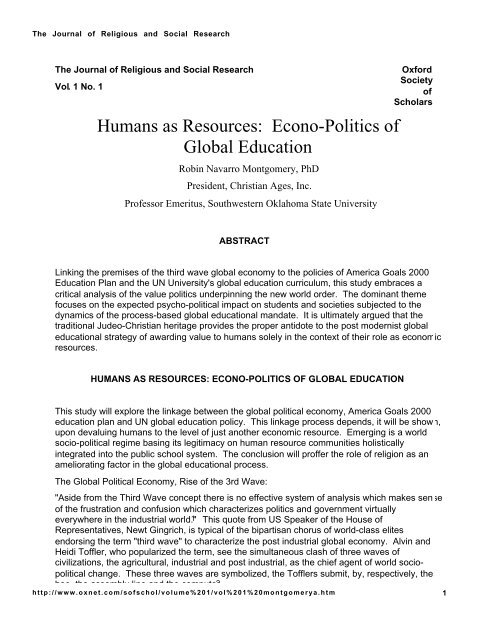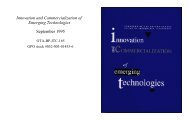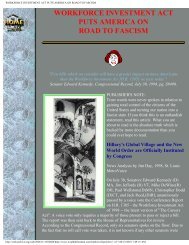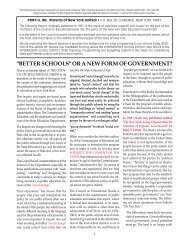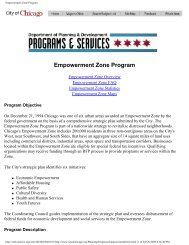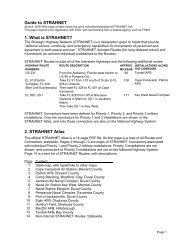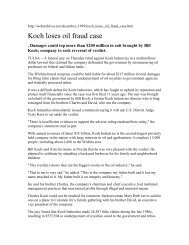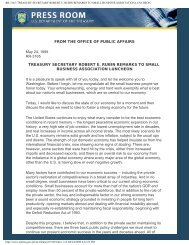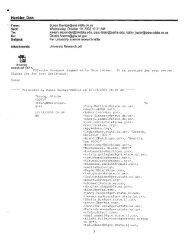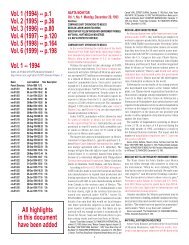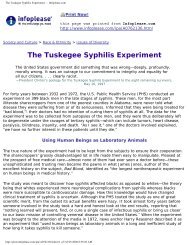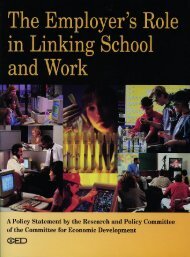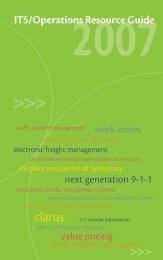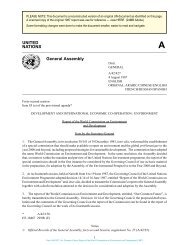Humans As Resources - Channeling Reality
Humans As Resources - Channeling Reality
Humans As Resources - Channeling Reality
You also want an ePaper? Increase the reach of your titles
YUMPU automatically turns print PDFs into web optimized ePapers that Google loves.
The Journal of Religious and Social Research<br />
The Journal of Religious and Social Research<br />
Vol. 1 No. 1<br />
<strong>Humans</strong> as <strong>Resources</strong>: Econo-Politics of<br />
Global Education<br />
Robin Navarro Montgomery, PhD<br />
President, Christian Ages, Inc.<br />
Professor Emeritus, Southwestern Oklahoma State University<br />
Oxford<br />
Society<br />
of<br />
Scholars<br />
ABSTRACT<br />
Linking the premises of the third wave global economy to the policies of America Goals 2000<br />
Education Plan and the UN University's global education curriculum, this study embraces a<br />
critical analysis of the value politics underpinning the new world order. The dominant theme<br />
focuses on the expected psycho-political impact on students and societies subjected to the<br />
dynamics of the process-based global educational mandate. It is ultimately argued that the<br />
traditional Judeo-Christian heritage provides the proper antidote to the post modernist global<br />
educational strategy of awarding value to humans solely in the context of their role as economic<br />
resources.<br />
HUMANS AS RESOURCES: ECONO-POLITICS OF GLOBAL EDUCATION<br />
This study will explore the linkage between the global political economy, America Goals 2000<br />
education plan and UN global education policy. This linkage process depends, it will be shown,<br />
upon devaluing humans to the level of just another economic resource. Emerging is a world<br />
socio-political regime basing its legitimacy on human resource communities holistically<br />
integrated into the public school system. The conclusion will proffer the role of religion as an<br />
ameliorating factor in the global educational process.<br />
The Global Political Economy, Rise of the 3rd Wave:<br />
"<strong>As</strong>ide from the Third Wave concept there is no effective system of analysis which makes sense<br />
of the frustration and confusion which characterizes politics and government virtually<br />
everywhere in the industrial world." 1 This quote from US Speaker of the House of<br />
Representatives, Newt Gingrich, is typical of the bipartisan chorus of world-class elites<br />
endorsing the term "third wave" to characterize the post industrial global economy. Alvin and<br />
Heidi Toffler, who popularized the term, see the simultaneous clash of three waves of<br />
civilizations, the agricultural, industrial and post industrial, as the chief agent of world sociopolitical<br />
change. These three waves are symbolized, the Tofflers submit, by, respectively, the<br />
hoe the assembly line and the computer2<br />
http://www.oxnet.com/sofschol/volume%201/vol%201%20montgomerya.htm 1
The Journal of Religious and Social Research<br />
hoe, the assembly line and the computer. 2<br />
Symbolized by computers, the post industrial or third wave economy centers on electronics.<br />
The Tofflers' thesis, in essence, echoes that of an earlier book entitled "Between Two Ages:<br />
America in the Technetronic Era" under the authorship of one time US National Security Advisor<br />
to President Jimmy Carter, Zbigniew Brezinski. 3 Like Brezinski, the Tofflers maintain that the<br />
trilateral political entities, the United States, Western Europe and Japan are driving the world<br />
economy. It is these three electronically based entities which constitute the backbone of the<br />
third wave economies. Furthermore, most of the trade of the big three is between themselves.<br />
Both Brezinski and the Tofflers expect this trend to continue, leaving behind progressively more<br />
of those countries and regions which cannot rise to their level of post industrial expertise. 4<br />
The third wave dominates the planet through its focus on networks of knowledge. Whereas the<br />
industrial-based second wave depends upon raw materials, land, labor and capital as the factors<br />
of production and strength, the third wave utilizes "data, information, images, symbols, culture,<br />
ideology and values" as its central resources. Its values are intangibles oriented towards<br />
"acquiring, generating, distributing and applying knowledge strategically and operationally." 5<br />
In the vein of the post modernist value base which they reflect, these factors are difficult to<br />
quantify, unlike more tangible second wave strengths such as inventory and buildings. 6<br />
Organizationally, third wave enterprises emphasize systems analysis. This is because of de<br />
massification. Becoming obsolescent are second wave companies organized for mass<br />
production and mass distribution. In the third wave small is beautiful. Successful enterprises<br />
are downsizing into manageable smaller units, only to paradoxically require the services of<br />
managers who think in terms of wholes in order to integrate the more numerous elements into<br />
workable patterns. The integration process of third wave decision-making must be orchestrated<br />
in the context of ever more rapid sequences of events. The reductionism characterizing second<br />
wave analysis of the industrial era is giving way to the third wave dictum that the "whole is<br />
greater than the sum of its parts." Synergistic thinking reigns supreme in the third wave. 7<br />
Politically, instead of traditional bureaucratic organization based on a hierarchical environment<br />
characterized by the expertise, impartiality and efficiency of the bureaucrat, third wave global<br />
political economy is better described by the term, SPINS, segmented polycentric integrated<br />
networks. Perceived differences and consequently advantages of SPINS over traditional<br />
bureaucracies include a horizontal rather than vertical information top-down flow, flexibility of<br />
input and output and more personalized communication. The most pronounced difference,<br />
however, lies in the endemic internationalism of the third wave as opposed to the nation-state<br />
reference point of the second wave. International networks or consortia of world class elites of<br />
governments, financial and economic conglomerates and even divisions of powerful families<br />
typically engage in ad hoc style communication, catalyzing the energy and style of the third<br />
wave.8<br />
Among the repercussions of third wave dominance is the growing gap between the haves and<br />
have nots of the world. For instance in 1960, as the post industrial third wave began its<br />
ascendance, the gap between the upper and lower 20% of the world's people stood at a<br />
differential of 30%. By the nineties, that gap had grown to 60%! 9<br />
In order to cope with this and other repercussions of the clash of civilizations Alvin and Heidi<br />
Toffler advocate a revision of the world's governments along three lines: a move from majority<br />
rule to minority based governments, a move in the direction of direct democracy and a turn<br />
toward what they call "decision-division". The last term refers to more formal sharing of<br />
information flow by international, national and local layers of decision-makers. 10 In the process<br />
of implementing the ruling structure of the new world order, third wave elites are fusing the<br />
http://www.oxnet.com/sofschol/volume%201/vol%201%20montgomerya.htm 2
The Journal of Religious and Social Research<br />
economic and political reins of power.<br />
The New Socialism & America Goals 2000:<br />
The blurring of political and economic power in the third wave context is generally referred to as<br />
the "new socialism." Economic clout being seen as the primary route to political power in the<br />
new world order, third wave governments are keying on educating workers skilled in the<br />
nuances and ambiguities surrounding the lexicon of the technetronic workplace. In order to<br />
negotiate a definitive escape from the industrial era, called for, many third wave elites believe, is<br />
a re-structuring of education on a global scale. In the United States, this re-structuring process<br />
centers on the concept of America Goals 2000.<br />
The immediate genesis of Goals 2000 dates to 1988. In that year the Carnegie Foundation, with<br />
Hillary Clinton on the board, set up the National Center on Education and the Economy, NCEE,<br />
with Marc Tucker as president. Tucker brought with him his belief in the restructuring of<br />
America's educational system to bring it into sinc with the post modernist value base of the<br />
global economy. Consequently, instead of objective or cognitive education with its emphasis<br />
upon individual reason, Tucker opted for affective or intuitive education in the post modernist<br />
sense. Accordingly, he set about to de-emphasize in the classroom objective exams leading<br />
toward diplomas, calling instead for what he called "certificates of mastery". The latter focuses<br />
on developing personality skills within a group context in order to attain certain outcomes,<br />
usually predetermined.11<br />
Tucker's NCEE orchestrated into being the Commission on the Skills of the American<br />
Workplace under the US Labor Department. With Ira Magaziner as its chairman, the<br />
commission produced a report in June 1990 entitled "America's Choice: High Skills or Low<br />
Wages." Among the report's findings were statistics projecting that by the year 2000 more than<br />
70% of the jobs in America would not require a college education. Consequent to this finding,<br />
the commission recommended, like Tucker before it, that objective exams be discontinued. In<br />
their place recommended were the three P's: projects, performance and portfolios. Students<br />
were to embrace a learning context emphasizing a process of interaction with their peers.<br />
Within this matrix of learning, they were to cooperate in engaging various projects. Recorded<br />
was to be student performance in terms of a "proper" attitude exuding sociability. The resultant<br />
"grades" were to be recorded in portfolios slated to follow the students throughout their lives and<br />
careers. This process-based framework generated the educational atmosphere most conducive<br />
to Marc Tucker's goal of a "seamless web" of services and skill development that would extend<br />
from "cradle to grave" and be the same for everyone. Tucker referred to his concept as the<br />
"human resource development system." 12<br />
Thus was the budding state of pedagogy which greeted President George Bush and Bill Clinton,<br />
then head of the national governors conference, upon the official release in April, 1991 of their<br />
pioneering document, America 2000. On the following June, the Secretary of Labor's<br />
Commission on Achieving Necessary Skills, SCANS, released a follow-up report. Entitled<br />
"What Work Requires of Schools, a SCANS report for America 2000," the report listed the<br />
workforce skills which all workers would need in the global economy. True to the third wave<br />
lexicon, advocated were such qualities as the ability to work with others as a member of a team,<br />
evidence of sociability, self esteem and the skill to see things in the mind's eye. In addition, the<br />
report implicitly embraced the new socialism, calling for the integration of academic and<br />
vocational education in the public schools. 13<br />
Riding the momentum of Tucker's and the Labor Department's initiatives, the year 1994 became<br />
a banner year for global education in America. In that year, Senator Ted Kennedy managed to<br />
muster through Congress the School To Work Opportunities Act, a blueprint for "a new human<br />
http://www.oxnet.com/sofschol/volume%201/vol%201%20montgomerya.htm 3
The Journal of Religious and Social Research<br />
g g pp , p<br />
resource development system." Echoing its philosophical mentor, Marc Tucker, the bill called<br />
for fundamental "systemic change." For instance, it mandated a comprehensive labor market<br />
data system which, among other things, would trace one's academic degrees and credentials,<br />
assessments and employment status at time of entry into system and work experience.<br />
Complementing the data system, called for was an elaborate system of local boards to engage<br />
such tasks as defining key industries, identifying workforce development needs, skills, incomes<br />
and occupations of local residents and setting up one-stop centers of service. 14<br />
Supplementary to the Kennedy bill, in 1994 "Goals 2000: Educate America Act" became the<br />
official education framework for a national system of education in the United States. <strong>As</strong> of<br />
1994, the architecture had been established for an educational system emphasizing America's<br />
role in the third wave global economy. A paradox immediately surfaced, however: while<br />
literature on the third wave de-emphasized bureaucracy in favor of more intuitively based<br />
SPINS, Goals 2000 called initially for three immense bureaucracies, one of which has since<br />
been aborted.15 General guidance of these bureaucracies would come from a non profit<br />
organization called New American Schools Development Corporation, NASDC, which would<br />
receive its underwriting from corporate sponsors. Third Wave New Socialism was in place with<br />
a second wave bureaucratic face.<br />
The two remaining new bureaucracies perform specific functions. The National Education<br />
Goals Panel, NEGP, orchestrates various goals in line with the philosophy of Goals 2000. 16<br />
For its part, the second extant bureaucratic entity embraces directly the new socialism. Named<br />
the National Skill Standards Board, NSSB, this entity initiates direct links between business and<br />
education through establishing business education partnerships while overseeing skill standards<br />
and assessments.17<br />
Operating under the guidelines of the above named bureaucratic structures, Goals 2000 seeks<br />
to incorporate several "break the mold features" in education. One of these features entails new<br />
teacher/mentor relationships. Building on trends from the nineteen sixties, teachers are shifting<br />
their role from direct imparter of knowledge to a vocational mold. Vocational training for<br />
practical tasks is now the model. Dating to the 1967 "B-Step" program proscribing behaviorism<br />
as the proper approach to earning, teachers themselves, are receiving behavioral conditioning<br />
to become "change agents" in the classroom. By 1974 the government had commissioned<br />
seven volumes of change agent studies. Tying change to information explosion, students were<br />
to be so over-loaded with information that they would be unable to control their own opinions. 18<br />
Other break the mold features include moving of classrooms into offices, libraries and<br />
technology centers, "clustering" of students of various ages to work together on projects and<br />
outcomes and integration of health and social services into schools sites. All of these focus<br />
ultimately on molding good citizens of the international community. The globalized citizen is the<br />
ideal, meaning one who could play well whatever role ever evolving international norms should<br />
proscribe for one. To be "good" in the traditional sense of discerning right and wrong is<br />
considered a throw-back to heterogeneous based intolerance. 19 Value building process<br />
competency in line with the values proscribed in the United Nations has become the mode.<br />
Global Education, The United Nations Perspective:<br />
The primary figure in the field of global education is Robert Muller, the president emeritus of the<br />
United Nations University in Costa Rica. Here, among what he describes as "cosmic" and<br />
"telluric" forces, he oversees the "Robert Muller Schools" 20 These schools develop world<br />
curriculum based on Muller's philosophy gleaned from numerous years within the United Nations<br />
Systems in multiple capacities.<br />
http://www.oxnet.com/sofschol/volume%201/vol%201%20montgomerya.htm 4
The Journal of Religious and Social Research<br />
In his book, "The New Genesis: Shaping a Global Spirituality", Robert Muller isolates his goals<br />
for our planet. "Our planet will be a world spiritual democracy" rather than a mere assemblage<br />
of nations, he states. [This will better enable us to meet the] "urgent need to determine the<br />
cosmic or divine laws which must guide our behavior on earth." The coming world spiritual<br />
democracy will be centered in the United Nations, he prophecies, which "is an entirely new<br />
event, a paradigm in evolution." 21<br />
Detail on the Robert Muller philosophy of education may be gleaned by incorporating it into the<br />
socialization formula of Joseph Campbell. By isolating, in order, a mythic, cosmological, sociopolitical<br />
and pedagogic framework partially echoing the Campbell scheme we may gain<br />
perspective on the purposes behind global education for the new world order.<br />
The mythic function concerns the search for ultimate meaning and purpose in life. In turn, the<br />
cosmological function seeks to explain the mythic in terms of local knowledge and experience.<br />
The socio-political function seeks to represent the local establishment as in accord with the<br />
sensed nature of the universe, i.e., as politically legitimate. This brings us to the pedagogical or<br />
educational function which presents desirable responses to life's challenges in line with the<br />
previous functions. The educational is arguably the key function in that it builds legitimacy in<br />
terms of all the preceding functions.22<br />
For Muller, educational facilities should begin at the mythical level by instilling in the student what<br />
Muller describes as a sense of "the infinitely small to the infinitely large." He means here a<br />
sense of interconnectedness of all things in the universe. Building on the mythic function, the<br />
cosmological function should center on multivision science, the idea that science should evoke<br />
images beyond just a preoccupation with the material. For Muller, science should reek of<br />
passion and mystery on the order of poetry. The socio-political function should, for Muller, give<br />
credence and legitimacy to what he calls "world servers", those self transcendent or self<br />
actualized ones who would lead the world spiritual democracy. 23<br />
Finally, we come to the pegagogical or educational function. Here Robert Muller reflects the<br />
classical Greek idea of paidea or the learning society focused on a search for its divine center.<br />
Educere, from which the word educate is derived, means in the Greek sense "to bring forth, as<br />
something latent." This is also reflective of the German word werden, to become, as to unfold<br />
from within.24<br />
For Robert Muller, and in general for most of the post modernist elite bent upon ushering in a<br />
new world order, the reason to be for each community in the world lies in incorporating this<br />
global image of unfolding from within what is potential. Architects of the new world order seek<br />
the proliferation of communities which "think globally," while "acting locally" within holistically<br />
integrated human resource communities.<br />
Conclusion, Holistically Integrated Human Resource Communities:<br />
The process based education of the new world order flows implicitly from the theological premise<br />
of God Immanent, the assumption that everything is ultimately part of a non material and<br />
impersonal force that is in constant process. The essence of man is therefore perceived as non<br />
material. That is, the real is only consciousness. From this perspective, it is literally<br />
consciousness which holds any structure together.<br />
Those whose consciousness matures to the level of self transcendence-the self actualized onesbecome<br />
the world servers.25 It is they who supposedly are able to think most lucidly in terms of<br />
relationship and integration of all things; it is they who evolve to think in terms of systems. The<br />
assumption is that systems beget systems which beget still more systems of holistically<br />
integrated thought patterns ad infinitum. Beginning at the community level, it is believed that this<br />
http://www.oxnet.com/sofschol/volume%201/vol%201%20montgomerya.htm 5
The Journal of Religious and Social Research<br />
integrated thought patterns ad infinitum. Beginning at the community level, it is believed that this<br />
system building process could proceed exponentially to encompass the whole planet and<br />
beyond throughout the universe, that is, it could with the proper holistically based focus on<br />
attitudinal based global education. This is the meaning of Robert Muller's mythic dictum to<br />
meditate on holistically integrating "the infinitely small to the infinitely large."<br />
Accordingly, in the budding new world order the holistically integrated community is slated to be<br />
the hub of global society. It is projected that these communities will exhibit signs of "high tech<br />
feudalism", given the decline of the industrial second wave with its emphasis on highway and<br />
other industrial infrastructure.26 In such societies, it is believed, it will "take a village" to raise a<br />
child, meaning that the purpose of the village in a high tech feudal era will revolve around<br />
community based education-the Greek paidea.<br />
Learning communities will center, appropriately enough, on the school. The multifunctional<br />
school is the future wave of the third wave. Health, counseling, latch key program for parents,<br />
meals for the elderly, parent training, job banks. These are only a few of the functions which<br />
are being concentrated in schools.27<br />
It is within this context that the previously mentioned policy of multi leveled boards charged with<br />
inventorying the community and beyond under the guidelines of third wave conglomerates<br />
comes into focus. These government appointed boards are charged with the duty of keeping<br />
track via student portfolios of the best attitudinal prospects for the ongoing job market. The value<br />
of the student is thus becoming defined in terms of a human resource. Student, and human<br />
value in general, is coming to stem from one's attitudinal, socialization skills as reflected in<br />
assessment tests. From these tests, data is gleaned determining one's suitability for the current<br />
job market.28 Those who fit into the system as is constituted at any given moment are highly<br />
valued. Those who do not, drop out, becoming losers. Their value as persons diminishes<br />
accordingly.<br />
Characteristics of such a system already in evidence include a US Educational Curriculum<br />
characterized by a wedding of behaviorism to humanistic therapy of the client-centered feel<br />
good variety. Reflecting the illogical combination of these two fundamentally different schools<br />
of thought, being de-emphasized are "boring" educational fundamentals such as correct<br />
grammar and logically rigorous thinking. The term "logocentric", meaning to espouse logical<br />
discourse, is becoming a matter of shame. 29 Typical of illogicality in educational circles is the<br />
notion that one's individuality can best be expressed by, paradoxically, surrendering one's<br />
individuality to the ever changing mores of the group process. The practical result is a<br />
disoriented society inundated with anxiety and depression.<br />
Given the US's status as the "unipolar" power in the post cold war era, the US's anxiety<br />
syndrome stands to permeate the world cultural milieu. Evidence of US influence on the world<br />
scene is found, for instance, in the generally recognized favorable impact which the Clinton<br />
Presidency has had on the political philosophy of British Prime Minister, Tony Blair. Blair and<br />
Clinton, in turn, are heavily influencing the policy perspectives of center left political parties and<br />
governments notably in Germany, France and Italy, et al. These like-minded regimes have<br />
even taken on a common label, "the Third Way", to describe their post modernist perspective on<br />
public policy.<br />
Referring to the third way, Tony Blair writes that embraced is the "center-left's traditional values<br />
of solidarity, social justice, responsibility and opportunity." 30 The third way fusion of social<br />
democracy and liberalism in light of post modernist basic premises provides the context for<br />
analysis of these four values. Solidarity may thus be defined as commitment to the group as the<br />
primary source of values. In a like manner, Blair's second value, social justice, finds meaning in<br />
the Platonic sense where justice lies in finding one's "natural" place in a process conditioned<br />
http://www.oxnet.com/sofschol/volume%201/vol%201%20montgomerya.htm 6
The Journal of Religious and Social Research<br />
the Platonic sense where justice lies in finding one s natural place in a process conditioned<br />
hierarchy. Likewise, one's place in the process-based hierarchy conditions one's<br />
responsibilities and opportunities.<br />
Consonant to third way values, public policy success is highly dependent upon education. Blair<br />
states that "Education is a critical policy." He advocates that government should be an "enabler"<br />
to help people embrace the world economy through better education and training. Blair<br />
furthermore states that educational "standards are the key to international competitiveness and<br />
inclusive society for the future."31 Translated, this means that central to the role of government<br />
is the function of "enabling" or "facilitating" the development of humans as economic resources<br />
within the confines of an "inclusive" society. In third way speak, an inclusive society means a<br />
society governed under the rhythms of process based group dynamics.<br />
With the pivotal regimes of the third wave political economy becoming riveted to the US policy<br />
process, the US is forfeiting an opportunity to acculturalize the world into the one religious<br />
tradition which grants the individual value apart from one's position within a group hierarchy.<br />
Through re-affirming America's Judeo-Christian heritage, the US could have it both ways: it<br />
could promote the eternal value of the individual person as a child of God, independent of the<br />
group context, while simultaneously granting transcendent credence and guidance to one's<br />
participation inside the group process.<br />
Perspective on this thesis may be derived from contrasting the role of group fellowship in a<br />
Biblically based setting with that of post modernism. In the former, the purpose of fellowship lies<br />
in leading the individual, as an individual, to communicate with God, who transcends the group,<br />
as the reference point of one's repentance and cleansing. On the other hand, the logic of post<br />
modern groupism proscribes that the individual first obtain repentance and cleansing from his<br />
"sin" of individualism as a prerequisite to gaining the fellowship of the group. Under the logic of<br />
post modernism, fellowship-and hence identity-is contingent upon individual conformity to the<br />
mores of the group.32<br />
Group-centered global education holds the key to implementing the new world order. 33 The<br />
concomitant devaluing of humans to the level of economic resources serving the almighty group,<br />
however, is the Achilles Heel of the new world order.<br />
ENDNOTES:<br />
1 Alvin & Heidi Toffler, CREATING A NEW CIVILIZATION: The Politics of the Third Wave<br />
(Atlanta: Turner Publishing Co., 1995), 16.<br />
2 Toffler, CREATING A NEW CIVILIZATION. See especially pages 17-34.<br />
3 (NY: Viking Press, 1970).<br />
4 It should be noted that, as of this writing, China appears to be initiating a challenge to Japan<br />
as the third leg of the trilateral power equation.<br />
5 Toffler, CREATING A NEW CIVILIZATION, p42.<br />
6 For insight on the post modernist perspective of new world order elites, see Robin<br />
Montgomery, "Transformational Politics of the New World Order," paper prepared for the Oxford<br />
Society of Scholars conference of 10 October, 1998.<br />
7 Toffler, CREATING A NEW CIVILIZATION, pp41-48 ff. Here the Tofflers delineate ten<br />
http://www.oxnet.com/sofschol/volume%201/vol%201%20montgomerya.htm 7
The Journal of Religious and Social Research<br />
relevant factors surrounding the new way of making wealth. Interestingly, in another work,<br />
around these same factors they frame an analysis of third wave war fighting traits. See their<br />
book, WAR AND ANTI-WAR: Survival at the Dawn of the 21st Century (NY: Little, Brown &<br />
Company, 1993), 64-79<br />
8 A pioneering work on SPINS is Virginia H. Hine, "The Basic Paradigm of a Future Sociocultural<br />
System", pp 239-247 in O.W. Markley & W.W. Harmon (eds). CHANGING IMAGES OF<br />
MAN (NY: Pergamon Press, 1982).<br />
9 Robert Muller & Douglas Roche, SAFE PASSAGE INTO THE TWENTY-FIRST CENTURY<br />
(NY: Continuum Pub. Co., 1995), 86.<br />
10 Toffler, CREATING A NEW CIVILIZATION, pp89-108.<br />
11 National Center on Education & the Economy, NCEE, Web Site. 19 Dec., 1997 http://<br />
www.ncee.org/Our Programs/overview.htm/ (viewed 31 August, 1998). Also, for an excellent<br />
summary of the events surrounding the rise of Goals 2000 see Stephanie Cecil, "The Seamless<br />
Web of Restructuring Education," pp 4,5 in The TORCH, vol. 2, no. 11 (Oct., 1995).<br />
12 Ibid., Also see The National Centers Workforce Development Program. 19 Dec., 1997.<br />
http://www.ncee.org/Our Programs/wfdPage.htm (viewed 1 September, 1998).<br />
13 National Skills, Standards Board, NSSB: Mission Statement, n.d. http://www.nssb.org/<br />
(viewed 31 August, 1998).<br />
14 The National Centers Workforce Development Program and S. Cecil, "The Seamless<br />
Web". For a good point-counterpoint analysis of the general thrust of Goals 2000 see on the<br />
one hand, a critical analysis in INSIGHT, Jennifer Marshall, Goals 2000: The Case for Repeal,<br />
n.d. http://www.townhall.com/townhall/FRC/insight/is95cled.htm (viewed 8 Sept., 1997). On the<br />
other hand, for a more favorable view of the legislation, see Goals 2000: A Progress Report-<br />
Misconceptions About Goals 2000, n.d. http://www.ed.gov/pubs/goals/progrpt/reality.htm<br />
(viewed 8 Sept., 1997).<br />
15 For a source on the aborting of the proposed Standards & Improvement Council, NESIC,<br />
see "Goals 2000: Legislation and Related Items" 30 July, 1998 http://www.ed.gov/G2k1/ (viewed<br />
5 September, 1998).<br />
16 See National Education Goals Panel, NEGP, homepage. 28 July, 1998. http://<br />
www.negp.gov/WEBPG50.htm (viewed 31 August, 1998).<br />
17 See the previously cited, National Skills Standards Board: NSSB: Mission Statement.<br />
18 B.K. Eakman, EDUCATING FOR THE NEW WORLD ORDER (Portland, Oregon: Halcyon<br />
House, 1991), pp228-30;122-25. An excellent study documenting the cold war context for the<br />
rise of behaviorism as an official government policy is Irene L. Gendzier, MANAGING<br />
POLITICAL CHANGE: Social Scientists & the Third World (Boulder, CO: Westview Press,<br />
1985).<br />
19 inter ilia, see "US Department of Education Goals 2000: Educate America Act. 16 Oct.,<br />
1996 http://www.ed.gov/G2k/g2k-fact.htm (viewed 31 August, 1998).<br />
20 Muller & Roche, SAFE PASSAGE INTO THE TWENTY-FIRST CENTURY, 112-114.<br />
21 Robert Muller, NEW GENESIS: Shaping a Global Spirituality (Garden City, NY: Image<br />
Books, 1984), 10.<br />
22 Markley & Harman, CHANGING IMAGES OF MAN, pp6-7.<br />
http://www.oxnet.com/sofschol/volume%201/vol%201%20montgomerya.htm 8
The Journal of Religious and Social Research<br />
y , , pp<br />
23 Muller, NEW GENESIS, especially pp159-68.<br />
24 Ibid. Markley & Harman, CHANGING IMAGES OF MAN, 137 & 174.<br />
25 For Robert Muller's view of the need for world servers see his NEW GENESIS, page 23, et<br />
al.<br />
26 James Dale Davidson & Lord William Rees-Mogg, THE GREAT RECKONING (NY: Simon<br />
& Schuster, 1993), 105, 70ff.<br />
27 AN INVITATION TO YOUR COMMUNITY: BUILDING COMMUNITY PARTNERSHIPS FOR<br />
LEARNING. Goals 2000: A World-Class Education for every child, n.d., (viewed 2 September, 1998). Also see in a collateral web site, Invitation to Your<br />
Community-Picture a Community. n.d., (viewed 2<br />
September, 1998).<br />
28 See the previously cited network source, The National Centers Workforce Development<br />
Program.<br />
29 Davidson & Rees-Mogg, THE GREAT RECKONING, p.111. For a brilliant critique of<br />
client-centered and related therapy, including its use in education, see Paul Vitz,<br />
PSYCHOLOGY AS RELIGION (Grand Rapids, MI, Wm. Eerdmans Pub. Co., 1994).<br />
30 Tony Blair, "A 'Third Way' to Achieve Modern Social Democracy," in "The International<br />
Herald Tribune," 28 September, 1998, p 10.<br />
31 Ibid.; also see E.J. Dionne, Jr., "President is looking for a 'third way' out," in "The Houston<br />
Chronicle," 25 September, 1998, p 30A. Barry James, "The Elusive 'Third Way'", in "The<br />
International Herald Tribune", 25 September, pp 1,7 and Tony Judt, "The Third Way to What<br />
We Need Some Direction", in "The International Herald Tribune", 29 September, 1998, p 11.<br />
32 For a brilliant analysis on this general point see especially chapter five in Harold Bussell,<br />
UNHOLY DEVOTION: Why Cults Lure Christians (Grand Rapids, MI: Zondervan Pub. House,<br />
1983).<br />
33 Among those making this claim is Robert Muller. See NEW GENESIS, p 22.<br />
http://www.oxnet.com/sofschol/volume%201/vol%201%20montgomerya.htm 9


